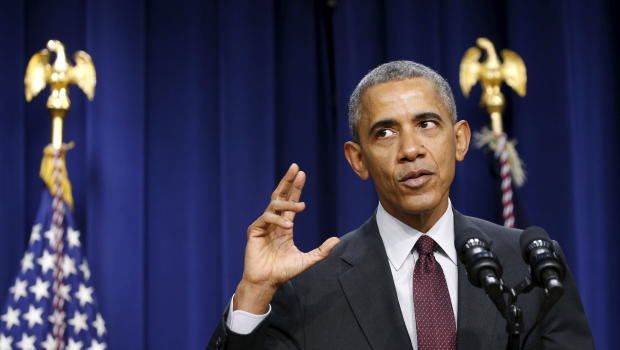The White House has released the final budget proposal of Barack Obama’s presidency, a $4.1 trillion program that includes a $10.25 per barrel tax on oil.
The Republican-controlled Congress is expected to reject it.
The leaders of the House and Senate budget committees jointly announced they would not invite Barack Obama’s budget director to testify before them.
Despite the setbacks, the White House has said the budget sticks to a bipartisan agenda reached last autumn.
Barack Obama’s last budget is for the 2017 fiscal year and would not take effect until October 1, 2016.
The tax on oil would raise $319 billion over 10 years. The US Treasury said that the tax would apply to both imported and domestically-produced oil, but would not be collected on US oil shipped overseas.
The plan would also temporarily exempt home-heating oil from the tax.
The White House said the tax “creates a clear incentive for private-sector innovation to reduce America’s reliance on oil and invest in clean energy technologies that will power our future”.
The tax would be paid by oil companies in order to boost spending on transportation infrastructure, including mass transit and high-speed rail, and autonomous vehicles.

President Barack Obama’s budget includes $11 billion to fight ISIS, plus money for early childhood education, and research and development.
The budget includes $19 billion in spending on cyber security that would allow for a overhaul of the federal government’s internal computing systems.
In 2015, systems at the Office of Personnel Management were hacked, exposing the personal information of government employees and job applicants.
The proposed budget envisions a deficit of $503 billion in the 2017 fiscal year after a $616 billion budget gap in the current fiscal year, which ends on September 30.
It seeks to cut deficits by $2.9 trillion over 10 years, largely through smaller tax breaks for wealthy earners, new savings in Medicare healthcare, and assumptions that adoption of its policies would boost economic growth.
Over 10 years, deficits would average 2.5% of US economic output, compared with about 4% in the Congressional Budget Office’s estimate, which is based on current laws.
“That [budget] document… will be President Obama’s final vision of how he lays out the fiscal future for the country,” said Joel Friedman, vice president for federal fiscal policy at the Center on Budget and Policy Priorities.
“I don’t think anyone expects it to be enacted this year. Republicans aren’t going to embrace it, but that doesn’t mean it’s not going to be a useful document.”
Congress can advance elements of the budget without endorsing the entire proposal.
